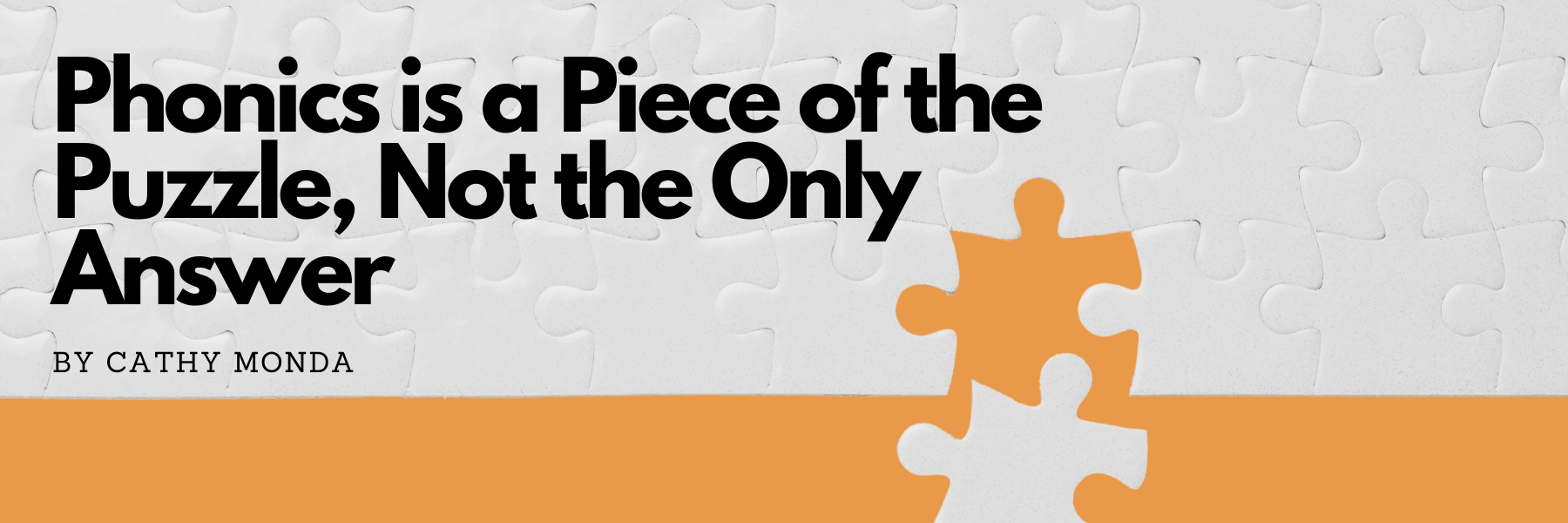BLOG
Phonics is a Piece of the Puzzle, Not the Only Answer
By Cathy Monda
After years of lopsided media stories overemphasizing phonics, I was happy to see EdWeek’s article, A Focus on Phonics or Comprehension? What Reading Research Should Look Like in Practice. As a teacher for 32 years and a Reading Recovery teacher for seven, anyone who knows me knows how much I LOVE my job and how passionate I am about teaching kids to read. I believe in what I do, and the data that comes out every year reflects the continued success of Reading Recovery. After reading this article, I felt compelled to share my experiences from working with struggling readers in lessons every day.
“…Phonics, which has made its way to the center of the “science of reading” movement, is neither the whole problem nor the whole solution. That’s because phonics only focuses on sounding out words. It does not support readers to understand or analyze those words.”
A Focus on Phonics or Comprehension? What Reading Research Should Look Like in Practice
There is no “one size fits all” solution for struggling readers. As any reading instructor knows, the past two years have brought the term Science of Reading to the forefront of literacy education. The basic definition of this term is that it is a body of growing research that deconstructs how children learn to read and the instructional practices that can get them there. It goes on to say that reading requires a complex combination of skills taught explicitly and systematically. YES!! Say it louder for the people in the back.
Explicit and Systematic teaching is what I do in every Reading Recovery lesson. Nowhere in that definition does it say we must focus mainly on phonics instruction. For instance, it references Scarborough’s Rope as an example of how all the components, including word recognition and comprehension skills, are woven together to create a skilled reader. The idea that the pendulum must swing to the side of literacy where a phonics monopoly is taking a front-row, center seat in our primary and intermediate classrooms (to improve national reading comprehension scores) is very misguided.
Phonics is essential — I know this, support this, and teach this every day. Research shows that oral language proficiency in the primary grades is a significant predictor of how well students will comprehend what they read now and in the future. Decoding is essential — I know this, support this, and teach this every day. Comprehension depends on robust and fluent decoding and other critical phonics skills — I know this, support this, and teach this every day.
The danger of phonics becoming the sole focus of literacy instruction by taking up large portions of our whole group reading block is that we neglect to save time for other components of teaching literacy that all readers will need to be successful, skilled readers who can independently seek meaning and solve problems while reading complex text. Yes, phonics is a critical cog on the literacy skill wheel, as are oral language, syntax, and semantics. Kids who can’t read yet live in a world of oral language (producing and understanding it), show us these skills don’t develop in isolation.
For example, take the line from a Harry Potter book, “It does not do well to dwell on dreams and forget to live.” How would a child find meaning in this with phonics alone? Likewise, I can decode a page of Spanish with a decent accuracy rate and a pretty good accent. However, understanding what I have read requires more than heavy phonics instruction alone. When we prioritize phonics over comprehension, struggling readers get lost in the shuffle.
 Catherine Monda is from Sarasota, Florida. She has been a teacher for over 32 years and a Reading Recovery teacher for seven.
Catherine Monda is from Sarasota, Florida. She has been a teacher for over 32 years and a Reading Recovery teacher for seven.
THE JOURNAL OF READING RECOVERY
Spring 2025
OPEN ACCESS: Centering Children and Working Towards Equity: Teaching All Children to Read by Catherine Compton-Lilly
Literacy Leadership in Support of Equity: Whatever It Takes by Allison Briceño
Exploring the Purposes, Power, and Potential of Familiar Reading by Jamie Lipp
Full Circle: From Student to Psychologist by Joyce Romano




